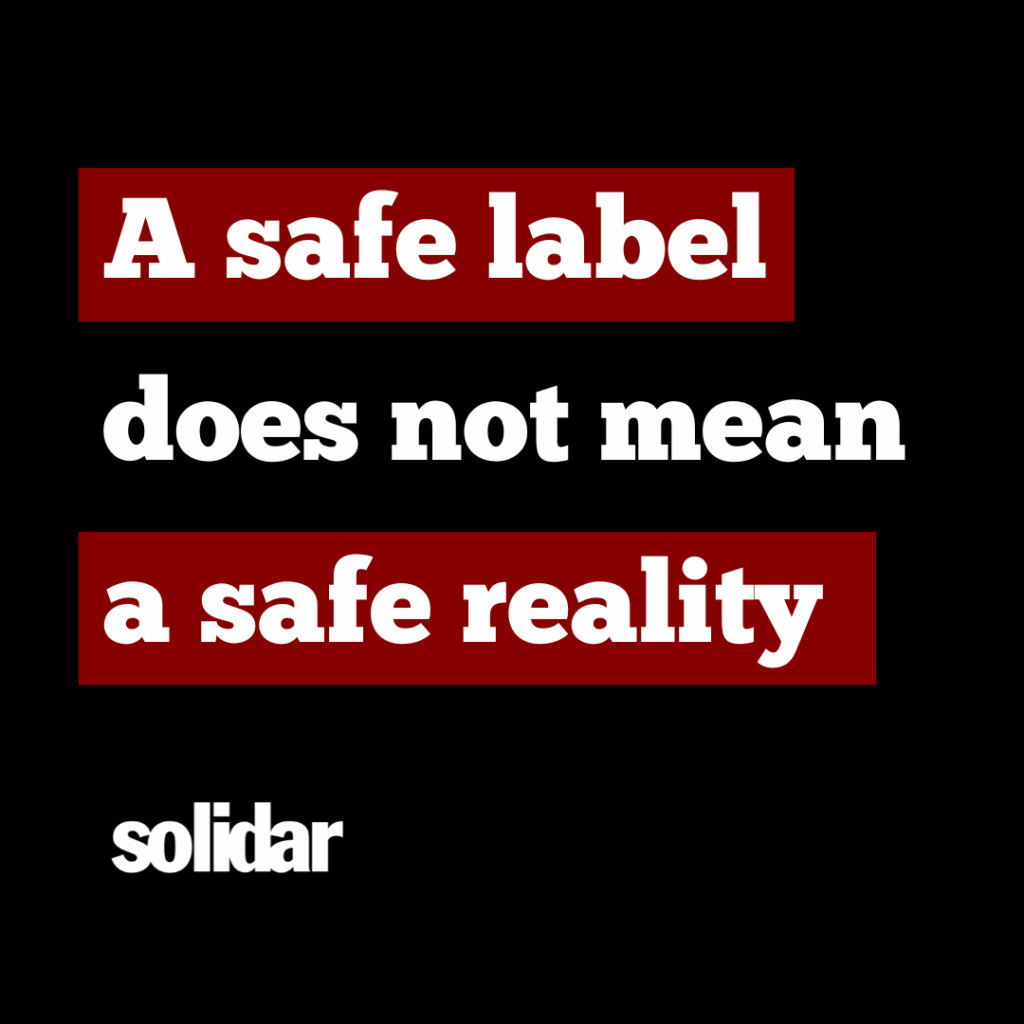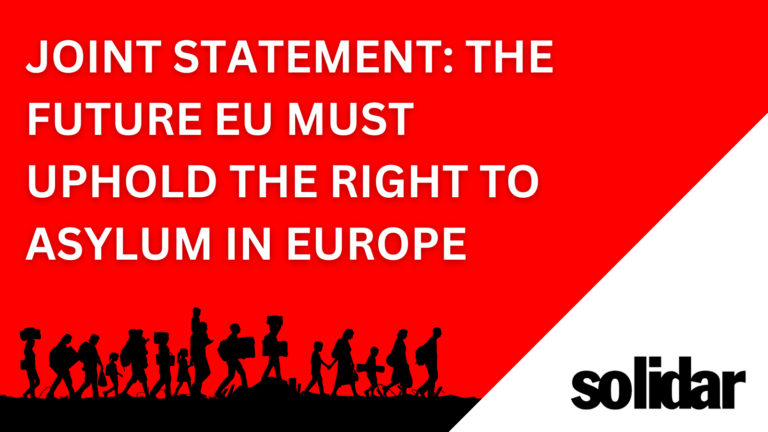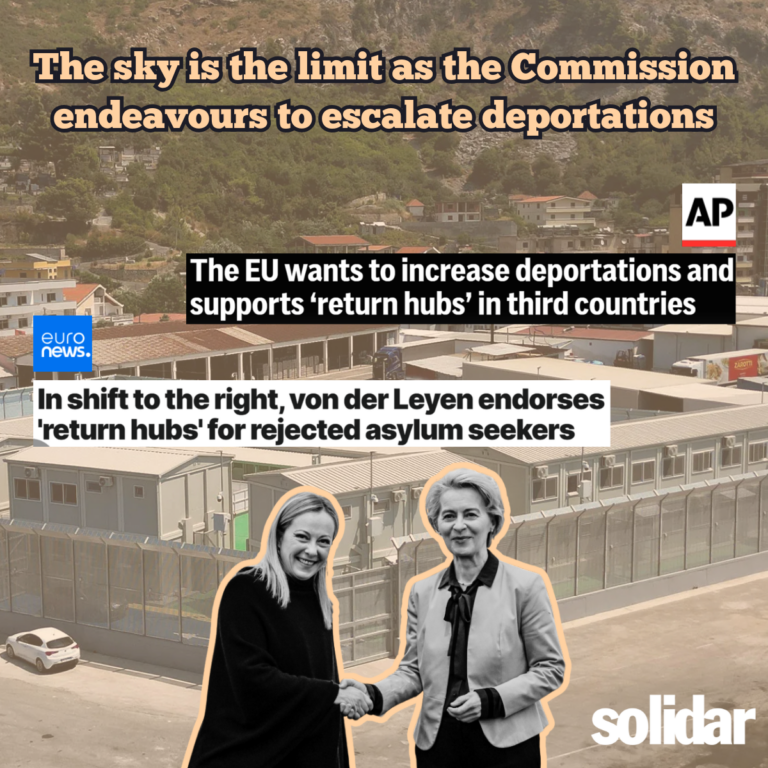EU ‘safe country’ and return proposals would seriously undermine protection and human dignity
The EU’s recent proposals in the area of migration and asylum risk seriously undermining people’s access to fair and full asylum procedures in Europe. The European Commission’s recent initiatives appear to be interconnected components of a broader strategy to externalise the bloc’s migration management – these include its proposed revision to EU return or deportation rules put forward in March 2025, its April 2025 EU list of ‘safe countries of origin’ and a revision to the ‘safe third country’ concept in May 2025. With these measures the EU seems to be seeking to further shift responsibility for refugee protection onto countries outside its borders and sidestep legal obligations under the Refugee Convention and EU law. SOLIDAR and 51 human rights, migrant rights and humanitarian organisations including members Migration Consortium, Arci and Progetto Sud signed a statement from International Rescue Committee, Danish Refugee Council and Amnesty International, calling EU leaders and co-legislators to rectify their course.

EU List of ‘Safe Countries of Origin’
The proposed EU list of ‘safe countries of origin’ deems certain countries, from which 20% or fewer applicants are granted international protection in the EU, to be safe. However, the fact that up to 20% of those applying for international protection from these countries are recognised as refugees indicates that these places are in fact not safe for all. Despite this, the proposed EU list allows for accelerated processing of asylum claims from nationals (or stateless individuals) of these countries under the assumption that their claims are likely to be unfounded.
As an aspect of the right to seek asylum, anyone who applies for protection in the EU should have their claim assessed individually and on its own merits – regardless of where they are fleeing from. The application of the ’safe country of origin’ rule undermines the individual assessment of asylum claims and increases the risk of individual vulnerabilities and protection needs being missed – including those of people with specific needs or from marginalised communities by allowing for accelerated processing of asylum claims under the assumption that their claims are likely to be unfounded. Procedural safeguards are also limited in these accelerated procedures – meaning, for instance, shortened timeframes and limited access by the claimant to legal and other support.
The proposed ‘safe countries of origin’ are Egypt, Tunisia, Bangladesh, Colombia, India, Kosovo, and Morocco, as well as, in principle, EU candidate countries. This is deeply concerning given that the Explanatory Memorandum itself lists risks of violations of human rights in all countries listed in the Commission’s proposal, ranging from widespread gender-based violence to severe threats human rights defenders face. This list of vulnerable groups in these third countries is non-exhaustive, and national asylum agencies across EU member states confirm that people from those countries remain in need of international protection, as their recognition rate has not lowered to zero.
Expansion of the ‘safe third country’ concept
A separate legislative proposal – the review of the ‘safe third country’ concept in the Asylum Procedures Regulation (which was introduced as part of the Migration and Asylum Pact and enters into force in 2026) – seeks to remove the current requirement for a personal connection between the asylum seeker and a third country where it is deemed they should have sought protection in the first place. Currently, the Regulation provides that Member States can avoid examining an asylum application on its merits only if it can be proven that the applicant has a meaningful connection to a ’safe third country’.
The Commission’s new proposal would effectively remove this mandatory criterion, paving the way for asylum seekers being sent to a country they have only briefly travelled through, or indeed have never set foot in and may have no link to whatsoever. Mere transit, or the existence of an agreement or ‘arrangement’ between an EU Member State and a third country would be considered sufficient grounds for an asylum seeker to be transferred to a country outside the EU.
The Commission proposal would also lead to the removal of the automatic suspensive effect of appeal in these cases. Therefore, asylum seekers could be forcibly transferred to a third country they have no link to before their appeal has been heard. This increases the risk of (chain) refoulement or of asylum seekers being unable to access their rights in line with the 1951 Refugee Convention and international human rights law. Dismantling this connection criterion is seemingly intended to increase the use of the ‘safe third country’ concept and further shift responsibility to third countries. This contradicts and harms the functioning of the EU asylum system and the global protection regime as whole.
Externalisation as the cross-cutting policy objective
The EU list of ‘safe countries of origin’ and proposed expanded use of ‘safe third country’ rules are clearly connected to the recently proposed Common European System for Returns. The proposed Return Regulation of March 2025 aims to streamline and expedite the return process for non-EU nationals denied permission to remain on EU territory. These different Commission proposals, taken together, reflect the EU’s determination to further externalise its asylum and migration policy, which is problematic on various accounts. Rather than promoting solidarity, these policies appear to signal a retreat from Europe’s commitment to asylum and risk contributing to a worrying erosion of refugee protection globally.
52 organisations call on the European Commission, the European Parliament, the Council, and member states at national level to uphold their obligations under EU and international law and to firmly reject any attempts to weaken protection for asylum seekers at and within EU borders as well as in cooperation with third countries on asylum and migration.
Access the full statement and list of signatories below.



